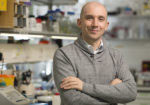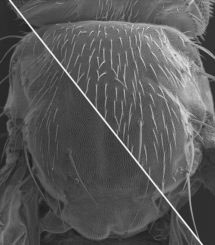

 Asymmetric cell division is the process by which one cell divides into two daughter cells that have different fates. Asymmetric division is the hallmark of stem cells, in which one daughter cell specialises to perform a specific function in the organism, while the other becomes another stem cell that keeps the ability to divide. We are interested in understanding how cell fate determinants segregate asymmetrically during asymmetric division. In particular, we focus on finding the molecular and physical mechanisms by which polarity cues are “written” onto the microtubule cytoskeleton during asymmetric division and how, in turn, these polarity signals are “read” by molecular motors to carry endosomes containing fate determinants into only one daughter cell. Our approach is highly pluridisciplinary, from reconstituted cytoskeleton systems in vitro, high-end quantitative imaging of trafficking in vivo during development, to analysis of morphological phenotypes in adult flies, relying on theoretical physics to bridge these different scales. We also develop novel imaging and bioengineering tools. For instance, we have developed techniques to induce polarity in unpolarised cells, using micropatterning and protein design. This induced polarity allows us to explore the molecular mechanisms underpinning symmetry breaking of the cytoskeleton. We also develop novel imaging technologies in collaboration with James Manton, in particular novel imaging modalities able to dissect the molecular interactome of fast cellular processes. Our long term vision is capitalize on this work in Drosophila to restore asymmetric cell fate in situations where it has been lost in mammalian stem cells, such as during ageing or tumorigenesis.
Asymmetric cell division is the process by which one cell divides into two daughter cells that have different fates. Asymmetric division is the hallmark of stem cells, in which one daughter cell specialises to perform a specific function in the organism, while the other becomes another stem cell that keeps the ability to divide. We are interested in understanding how cell fate determinants segregate asymmetrically during asymmetric division. In particular, we focus on finding the molecular and physical mechanisms by which polarity cues are “written” onto the microtubule cytoskeleton during asymmetric division and how, in turn, these polarity signals are “read” by molecular motors to carry endosomes containing fate determinants into only one daughter cell. Our approach is highly pluridisciplinary, from reconstituted cytoskeleton systems in vitro, high-end quantitative imaging of trafficking in vivo during development, to analysis of morphological phenotypes in adult flies, relying on theoretical physics to bridge these different scales. We also develop novel imaging and bioengineering tools. For instance, we have developed techniques to induce polarity in unpolarised cells, using micropatterning and protein design. This induced polarity allows us to explore the molecular mechanisms underpinning symmetry breaking of the cytoskeleton. We also develop novel imaging technologies in collaboration with James Manton, in particular novel imaging modalities able to dissect the molecular interactome of fast cellular processes. Our long term vision is capitalize on this work in Drosophila to restore asymmetric cell fate in situations where it has been lost in mammalian stem cells, such as during ageing or tumorigenesis.
Asymmetric division of a sensory organ precursor cell where endosomes containing cell fate determinants (green) are asymmetrically segregated into only one daughter cell thanks to symmetry breaking of the microtubule cytoskeleton (red).
Microtubule dynamics during development of the notum epithelium in Drosophila. Asymmetrically dividing sensory organ precursors are labelled in red.
Selected Papers
- Watson, JL., Seinkmane, E., Styles, CT., Mihut, A., Krüger, LK., McNally, KE., Planelles-Herrero, VJ., Dudek, M., McCall, PM., Barbiero, S., Vanden M., Yeu, S., Porebski, BT., Zeng, A., Rzechorzek, NM., Wong, DCS., Beale, AD., Stangherlin, A., Riggi, M., Iwasa, J., Morf, J., Miliotis, C., Guna, A., Inglis, AJ., Brugués, J., Voorhees, RM., Chambers, JE., Meng, Q., O’Neill, JS., Edgar, RS., Derivery, E (2023)
Macromolecular condensation buffers intracellular water potential.
Naturehttps://doi.org/10.1038/s41586-023-0662 - Watson, JL., Krüger, LK., Ben-Sasson, AJ., Bittleston, A., Shahbazi, M., Planelles-Herrero, VJ., Chambers, JE., Manton, JD., Baker, D., Derivery, E. (2023)
Synthetic Par polarity induces cytoskeleton asymmetry in unpolarized mammalian cells
Cellhttps://doi.org/10.1016/j.cell.2023.08.034 - Healy MD & McNally KE & Butkovic R, Chilton M, Kato K, Sacharz J, McConville C, Moody ERR, Shaw S, Planelles- Herrero VJ, Yadav SKN, Ross J, Borucu U, Palmer CS, Chen K, Croll TI, Hall RJ, Caruana NJ, Ghai R, Nguyen THD, Heesom KJ, Saitoh S, Berger I, Schaffitzel C, Williams TA, Stroud DA, Derivery E, Collins BM, and Cullen PJ (2023)
Structure of the Commander endosomal trafficking complex linked to X-linked intellectual disability/Ritscher-Schinzel syndrome
Cellhttps://doi.org/10.1016/j.cell.2023.04.003 - Wu K, Bai H, Chang Y, Redler R, McNally K, Sheffler W, Brunette TJ, Hicks DR, Morgan TE, Stevens TJ, Broerman A, Goreshnik I, DeWitt M, Chow CM, Shen Y, Stewart L, Derivery E, Silva DA, Bhabha G, Ekiert D, Baker D. (2023)
De novo design of modular peptide binding proteins by superhelical matching
Naturehttps://doi.org/10.1038/s41586-023-05909-9 - Planelles-Herrero VJ, Bittleston A, Seum C, Daeden A, Gaitan MG, Derivery E. (2022)
Elongator stabilizes microtubules to control central spindle asymmetry and polarized trafficking of cell fate determinants
Nat Cell Biol.https://doi.org/10.1038/s41556-022-01020-9 - Ben-Sasson, AJ., Watson, JL., Sheffler, W., Johnson, MC., Bittleston, A., Somasundaram, L., Decarreau, J., Jiao, F., Chen, J., Mela, I., Drabek, AA., Jarrett, SM., Blacklow, SC., Kaminski, CF., Hura, GL., De Yoreo, JJ., Kollman, JM., Ruohola-Baker, H., Derivery, E., Baker, D (2021)
Design of biologically active binary protein 2D materials.
Naturehttps://doi.org/10.1038/s41586-020-03120-8 - Watson, J.L., Aich, S., Oller-Salvia, B., Drabek, A.A., Blacklow, S.C., Chin, J., Derivery E. (2021)
High-efficacy subcellular micropatterning of proteins using fibrinogen anchors
J Cell Biol. 220(2): https://doi.org/10.1083/jcb.202009063 - Derivery E, Seum C, Daeden A, Loubéry S, Holtzer L, Jülicher F, Gonzalez-Gaitan M. (2015)
Polarized endosome dynamics by spindle asymmetry during asymmetric cell division.
Nature 528: (7581):280-5.
Group Members
- Megan Clapperton
- Gillian Griffiths
- Akaash Kumar
- James Manton
- Kerrie McNally
- Julie Miesch
- Patrick O'Donnell
- Vicente Jose Planelles Herrero
- Sarah Triclin

